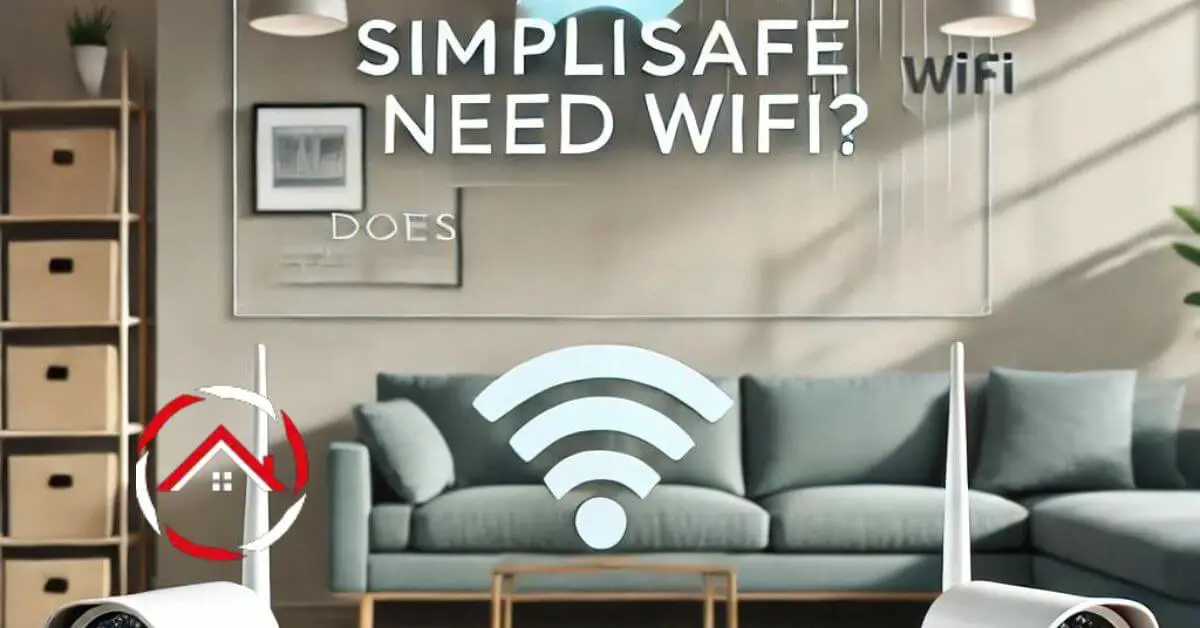Wondering if SimpliSafe needs Wi-Fi? The answer depends on how you plan to use it. SimpliSafe can work without Wi-Fi, but to unlock its full potential, a Wi-Fi connection is ideal.
With Wi-Fi, you’ll get real-time alerts, remote access, and integration with smart devices. Without it, SimpliSafe still protects your home but with limited features.
It’s a great option for those who want flexibility. Whether you prefer a fully connected experience or just basic home security, SimpliSafe has you covered. Keep reading to learn “Does SimpliSafe need WiFi?” to enhance your system.
Read more: Review of SimpliSafe Home Security System
Table of Contents
Does SimpliSafe Need WiFi? An Ultimate Guide
SimpliSafe is a flexible home security system that offers both wired and wireless options. But does it actually need Wi-Fi? Here’s a breakdown:
- Basic Functionality: SimpliSafe does not require Wi-Fi to function. The system uses cellular signals to connect with the monitoring center, ensuring that your home is protected even without Wi-Fi.
- Wi-Fi Benefits: For features like real-time alerts, camera footage, and remote control via the app, Wi-Fi is necessary. It enhances convenience and overall security.
- Without Wi-Fi: Even without a Wi-Fi connection, SimpliSafe can still sound alarms and contact emergency services. However, you’ll miss out on app access and smart home integration.
- Conclusion: SimpliSafe works both with and without Wi-Fi. For basic security, Wi-Fi isn’t required. But if you want full functionality, a Wi-Fi connection is highly recommended.
What Are SimpliSafe WiFi Requirements?
SimpliSafe can run without WiFi, but for optimal performance, a strong and stable connection is highly recommended. Here are the essential WiFi requirements you need to know to make sure your SimpliSafe system runs smoothly.
1. Minimum Speed for Video Streaming
For SimpliSafe cameras, a minimum upload speed of 2.5 Mbps is necessary to stream live footage and record clear videos without delays.
2. WiFi Frequency Band
SimpliSafe devices connect to a 2.4 GHz WiFi network. This frequency provides a wider range, making it ideal for home security setups.
3. Stable Internet Connection
A consistent, stable connection ensures that your system stays connected to the monitoring service and can send real-time alerts. Frequent drops in connectivity could result in delayed notifications.
4. Router Compatibility
Ensure your router supports modern encryption standards (WPA2 or WPA3) to keep your home network and SimpliSafe system secure from hackers.
5. No Data Caps
If your internet provider has data caps, keep in mind that video recording and streaming can use a lot of bandwidth. Unlimited data is recommended for smooth performance.
6. Location of WiFi Router
Place your WiFi router centrally in your home for better signal coverage. SimpliSafe devices need a strong signal to function efficiently, especially for cameras.
7. Power Backup for WiFi
In case of a power outage, consider having a backup battery for your WiFi router. This ensures that your SimpliSafe system remains functional even when the power goes out.
Does SimpliSafe Require a Subscription?
SimpliSafe does not require a subscription to work, but having one unlocks additional features. Without a subscription, you still get basic protection, including alarms and local sirens.
However, you won’t have access to professional monitoring, video recording, or real-time alerts.
With a subscription, you can opt for 24/7 monitoring, remote control through the app, and advanced security features like cloud storage for cameras.
It’s an affordable, optional service that enhances the overall system. So while SimpliSafe can function without a subscription, subscribing adds peace of mind and more robust protection.
SimpliSafe WiFi Extender Setup
If your SimpliSafe devices are too far from the router, adding a WiFi extender can help improve the signal. Here’s a simple guide to set up a WiFi extender with your SimpliSafe system.
- Step 1: Choose the Right Extender
Ensure the WiFi extender is compatible with 2.4 GHz networks, as this is what SimpliSafe devices use. - Step 2: Place the Extender
Position the WiFi extender midway between your router and the SimpliSafe device that needs better coverage. - Step 3: Plug in the Extender
Plug the WiFi extender into a power outlet and turn it on. - Step 4: Connect to the Extender’s Network
On your phone or computer, connect to the WiFi extender’s network through the WiFi settings. - Step 5: Set Up Using the App
Follow the extender’s setup instructions in its app or user manual to connect it to your home’s WiFi network. - Step 6: Test the Signal
Check that your SimpliSafe devices now have a stronger connection by testing their performance or signal strength. - Step 7: Relocate If Needed
If the signal still isn’t strong enough, move the extender closer to your SimpliSafe devices and try again.
Wrap Up
SimpliSafe doesn’t need Wi-Fi to protect your home, but using it with Wi-Fi unlocks extra features.
With Wi-Fi, you get real-time alerts, video monitoring, and control through the mobile app. Without it, SimpliSafe still provides essential protection, such as alarms and emergency contacts.
It’s a great system that offers flexibility, depending on your needs. Whether you’re looking for basic security or a fully connected experience, SimpliSafe has options for you. So, while Wi-Fi enhances the system, it’s not required to keep your home safe.
Frequently Asked Questions
Does SimpliSafe need WiFi to function?
No, SimpliSafe doesn’t require WiFi for basic functions. It uses a cellular connection for monitoring and alerts. However, WiFi enhances features like remote access, video streaming, and faster updates, making the system more efficient with an internet connection.
Can SimpliSafe work without internet?
Yes, SimpliSafe can operate without internet. The system’s cellular backup ensures monitoring and alert services continue if WiFi goes down. However, internet access is essential for features like smartphone control, live video feeds, and quicker software updates.
What happens if SimpliSafe loses WiFi?
If SimpliSafe loses WiFi, the system switches to its cellular backup. Core security functions remain operational, including monitoring and alerts, but features like app control and camera streaming will be unavailable until the WiFi connection is restored.
Is cellular monitoring better than WiFi for SimpliSafe?
Cellular monitoring is crucial for reliability, as it ensures SimpliSafe remains functional even if WiFi fails. While WiFi offers additional features like app access and faster updates, cellular backup provides critical security, ensuring protection during power or internet outages.
References:
support.simplisafe.com. Does SimpliSafe® require Wi-Fi or a Computer to Work? https://support.simplisafe.com/articles/using-your-system/does-simplisafe-require-wifi-or-a-computer-to-work/63447a21d9a8b404da76cc0c


